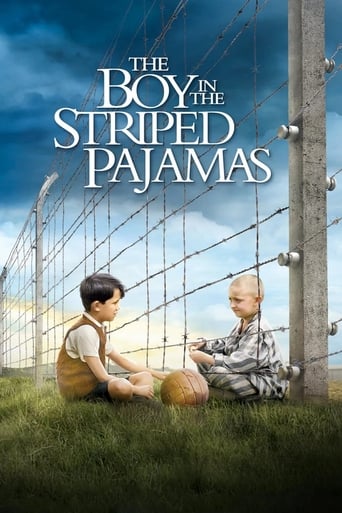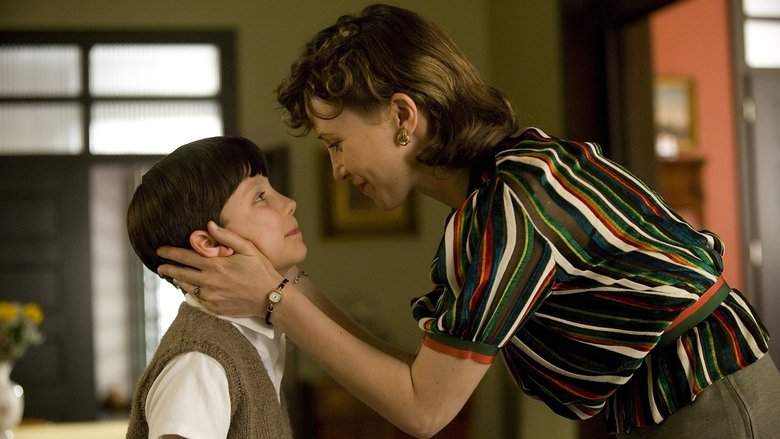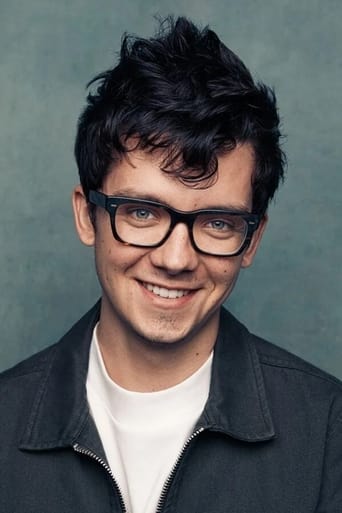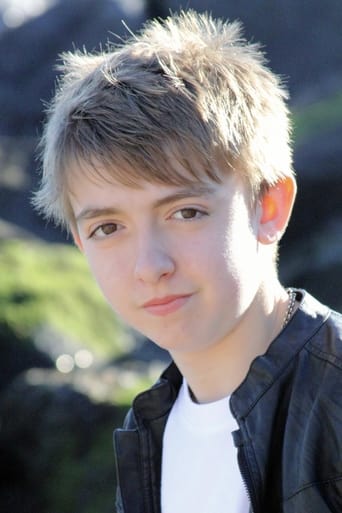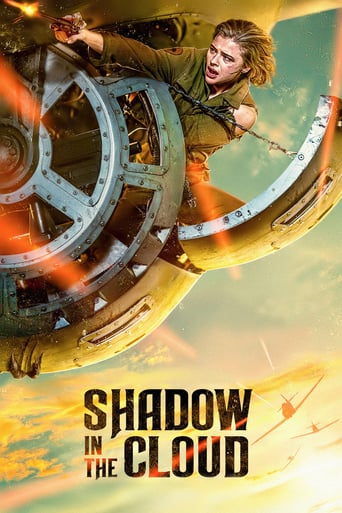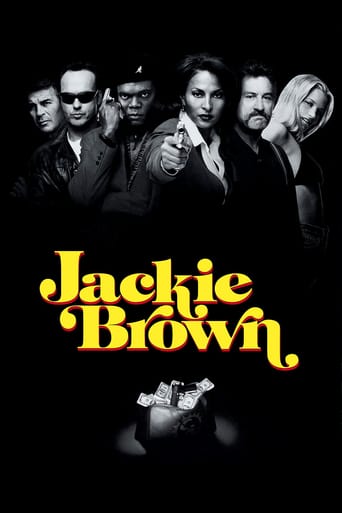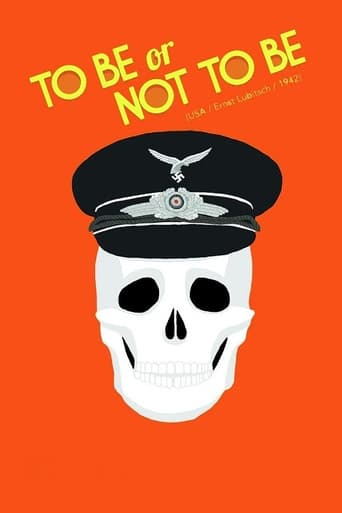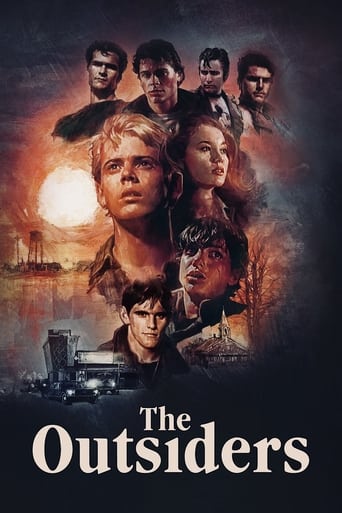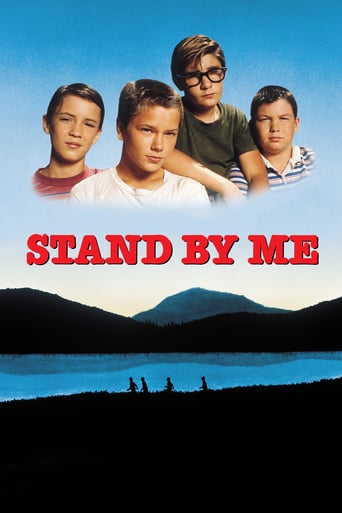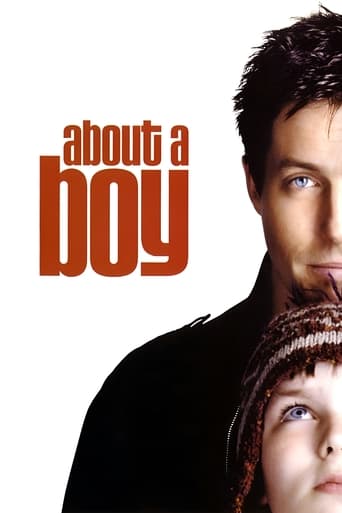The Boy in the Striped Pyjamas (2008)
When his family moves from their home in Berlin to a strange new house in Poland, young Bruno befriends Shmuel, a boy who lives on the other side of the fence where everyone seems to be wearing striped pajamas. Unaware of Shmuel's fate as a Jewish prisoner or the role his own Nazi father plays in his imprisonment, Bruno embarks on a dangerous journey inside the camp's walls.
Watch Trailer
Cast


Similar titles
Reviews
This movie contains some emotional things, maybe you would find hyperbole. Because of you can feel who produce use your feel about a kid at the end of film, like I feel. But generally theme was good. Yes, we know there are many 2nd war scenarios and sometimes they are copy of each of them. But this movie wasn't without end. It has extremely original story. Yes I didn't like end, but it is best appropriate end for this movie. Because story has to be end stunning as possible as.
When watching this film I think it's best remembered that this story was written for children to help them understand the holocaust (if such a thing were possible). The plot is simple and the historical accuracy has been maligned, however I don't think this makes it an insult to survivors and victims as others have suggested. The acting is sensitively done and I thought the 'ordinariness' of it all (as very little of the camp is shown until the end) actually brought home the reality of it. Same goes for the English accents. For English speaking audiences I thought this really made the characters seem even more like a family who could be living next door. It's too easy to call the perpetrators of the holocaust evil. They were ordinary men with families which makes it all the more chilling and thought provoking. Up until the ending I thought this was an 'easy' film which surprised me given the subject, but it builds to the last scenes which did exactly what every good account on the holocaust should do - made you think 'Never again'.
War is said to either bring people together or tear them apart. The movie The Boy in the Striped Pajamas demonstrates both outcomes in a heart wrenching tale about a Nazi soldier's son and his unlikely new companion. The heartbreaking story begins in Berlin, where the son Bruno's life is that of an ordinary eight years old boys. All this will change once his Father asks the family to go with him on his assignment as a soldier during World War II, where the progression of tragedy begins. This tragic story is brought to life through many aspects such as acting, costume, and plot, all of which give the movie great emotional appeal. This movie would not have this great emotional appeal if it were not for the actors. Asa Butterfield brilliantly portraits the son, Bruno. For such a young actor Butterfield shocks his audience with such great expression of emotion. Asa makes his act believable through his facial expressions and delivery of lines. Often when he speaks his voice echoes innocence and when appropriate, confusion. The main physical feature he uses to portray his innocence are his eyes. He often widens them in awe and uses them to connect with the audience by looking either directly in the camera or intently at the other characters. One of those other characters is his father, who is also a Nazi soldier, played by David Thewlis. As the story progresses David smiles less and less showing how the war is beginning to impact his character. He shows little reaction to the cruelty played out in the movie, hardly flinching. This stillness that David brings further portraits his character as a harsh, unforgiving Nazi soldier and starkly contrasts Bruno. There is an even greater contrast seen between the Jewish and German characters in the film. This contrast is emphasized through the characters of Bruno and Schmuel with the use of costume and set. Bruno is a well dressed little boy, surrounded by a well dressed family, in a big beautiful house. While Schmuel, who lives but a mile away, wears rags in a fenced in suffering "community". While what they wear sets them apart, what really shows the social divide between the Germans and Jews is the wall around Bruno's home. When first driving up to the house it is evident that what is inside the boundaries of their home is vastly different from what is on the outside of it. This movie does a wonderful job in costume and set, setting up the movie for success in showing the social divide between the Jews and Germans during World War II. Mark Herman, the director has a lot to do with the success of the movie as well. Thanks to him the plot progresses in a way that flows and wastes no scenes. The movie lets you see glimpses into how the war impacted each person's life differently. From the grandparents to Bruno's sister we get a taste of the many different perspectives on the war. While the movie could have expanded on the other character's experiences a bit more, having only a brief look allows for each scene to serve a purpose and avoids filler. Due to that success in plot the movies emotional appeal continues to be its best quality throughout the film. This original idea to show a Nazi soldier's son and an eight years old Jewish prisoner leads the audience to feel great sadness. This sadness is not only drawn from the film but from a real history of hatred towards a people who were not understood. The Boy in the Striped Pajamas is not a movie to be watched purely for entertainment, but also to reflect on the past and on the actions of the Nazi's towards the Jews. That is what brings true greatness to the film not just the acting, progression of plot, and costume, but the historical accurateness.
I didn't know all that much about this film going in, so it was a nice surprise to see actors I recognized such as Vera Farmiga who played Lorraine Warren in The Conjuring, and Madolyn in The Departed, and also David Thewlis who played Professor Lupin in Harry Potter and the Prisoner of Azkaban. The film didn't give any specific date or year that the story took place in, which was interesting because I would have liked to place the exact year and what events were going on in Germany at that point in time. Initially I expected a formulaic Holocaust movie that was significantly watered down to make it more watchable for audiences and teenagers considering this was given a PG-13 rating, but that was definitely not the case, especially with ending.The opening shot was great and really caught my eye. It gave the film a very innocent full of life feel. The colors and cinematography as a whole was another thing I loved. Benoît Delhomme (the director of photography) did a great job of using such vivid colors which made this seem like the audience was watching a story through the eyes of a child, and also reminded the audience that the story is being told from a Nazi perspective. As Bruno starts to realize what is happening, his clothes become darker and more faded. Additionally, when Bruno gets into the camp, the colors become washed-out which gives the film a depressing tone. Another thing I noticed is that both Bruno and his father had blue eyes, but only Bruno's were light and full of life, while his fathers were darkened. This could be a contrast of a child's innocence and an adult corrupted by power.I additionally had a few problems with the film. If this is about Nazi Germany and set in the countryside of Berlin, why do all the characters speak English with British accents? It would have been much more realistic and effective if the entire movie was in German. There were also many references to airplanes when the kids were playing throughout the film, but this was never explained. Why did this happen in the first place? Another problem I had was how large the holes in the fence were in the camp. Couldn't Shmuel have easily crawled through one of them? Weren't there any guards watching the fence? It didn't look like it. The characters additionally kept referring to Germany as the 'Fatherland', whereas Hitler always referred to it as the 'Motherland'. Shouldn't the characters mimic this to be more historically accurate? The biggest issue I had with the plot line was that the entire story was implausible. There were no 9-year-olds in the camps. If someone was not old enough to worked, they were immediately put to death.As a whole, apart from these criticisms, I really enjoyed this film. The soundtrack was absolutely lovely and joyous, which was also a great contrast to the dark setting of the Holocaust. The entire cast did amazingly, but the most notable performances were from Farmiga and Butterfield. Also a nice touch that was added was the vans in the background every so often when Bruno was playing on the swing, so that the audience wouldn't get lost in the story of a kid, and are reminded of what this movie was really about. I also appreciated the themes of adults and their relationships with children. Not only does the teacher in the film completely brainwash the two kids, but any time they have a chance, the parents shelter and lie to the kids about what is really going on in the country. The ending had such a great climax and an upsetting, yet effective, conclusion. I knew there wouldn't be a happy ending, considering the subject matter, but the way this ended was extremely unexpected.

